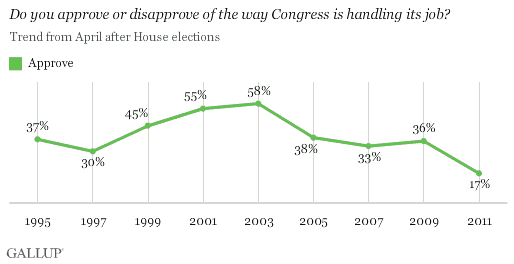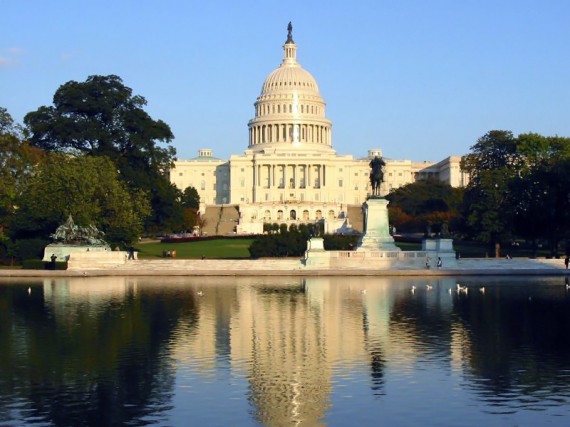Everybody Hates Congress
Contempt for Congress is an old American tradition. Unfortunately.
Two new polls make clear that the change in leadership hasn’t done anything to improve the public’s opinion of Congress:
PRINCETON, NJ — Congress’ approval is at 17%, essentially unchanged from last month’s 18%, and identical to where it was just after last November’s midterm congressional elections. The current rating is just four percentage points above the all-time low of 13% from December.
Congress’ approval rose slightly in January and February as the new 112th Congress took office, before dropping back in March. This is a typical pattern, which was also evident after a new party took control of the House in 1995 and 2007. In both of those years, congressional approval rose in the initial months of the new Congress, and then settled back down, as it has this year.
Additionally, Americans’ view of Congress is lower now that it was at comparable post-election periods in the past:
 Of course, this is partly a continuation of a trend that has made itself apparent over the past decade:
Of course, this is partly a continuation of a trend that has made itself apparent over the past decade:
Americans’ views of Congress have generally been low in recent years, averaging 20% this year and 19% last year, compared with the historical average of 34%. The highest congressional approval rating since Gallup began measuring approval systematically in 1974 was 84% in October 2001, shortly after the Sept. 11 terrorist attacks. Congressional approval has been below the 50% level since July 2003.
The job approval numbers for Congress are even worse in a new Rasmussen poll:
As members of Congress and the president haggle over ways to reduce the federal budget deficit, ratings for the bicameral legislature have fallen to the lowest level since late 2008.
The latest Rasmussen Reports national telephone survey of Likely Voters shows that nine percent (9%) now say Congress is doing a good or excellent job. Fifty-six percent (56%) rate the Congressional performance as poor. (To see survey question wording, click here.)
Positive grades for the legislators are down from 13% last month and are the lowest measured since December 2008. The number of voters who give Congress a poor grade is up seven points from last month and is the highest negative review since Republicans took control of the House in January.
From January 2007 through December 2010, with Democrats in control of both the House and Senate, the legislature earned good or excellent marks ranging from 9% to 26%. The high water mark was reached in May 2007. Poor marks for the Democratic tenure ranged from a low of 35% to a high of 71%. That 71% negative rating was reached just before the health care bill became law.
In the four months since Republicans took control of the House, positive ratings for Congress have ranged from nine percent (9%) to 15%, while poor marks have run from 42% to 56%. Democrats continue to control the Senate.
It’s easy to point to particular contemporary examples of Congressional action as the reason why the public holds the United States Congress as an institution in such contempt. There’s certainly been plenty to point to over the past several years whether it’s sitting on the sidelines while questionable wars were fought in the American people’s name, or running up debt without any idea of how it’s going to be repaid, or pursuing unpopular legislation. It’s also very easy to make the analysis partisan by blaming on the action, or inaction, of whoever happens to control Congress at a given time. As Jonathan Bernstein points out, though, hating Congress has been an American pastime for almost as long as there’s been a United States Congress:
Everyone hated Congress in the pre-institutionalized Congress of the 19th century, when it was the House that had the filibuster; they hated Congress when it ran with ruthless efficiency under Speakers Reed and Cannon and during the early years of Woodrow Wilson’s presidency; they hated Congress during the New Deal; they hated it during the era of bipartisanship and the conservative coalition; they hated it when liberals took over and ended segregation and passed Medicare and Medicaid; they hated the reformed Congress of the 1970s; they hated it during the era of divided government; they hated it after the rise of the routine filibuster in the Senate; they hated it when the Gingrich Republicans took over; they hated it when the historic 111th passed tons of legislation. Trying to connect the American people’s deep and long-standing contempt for their Congress with any particular set or arrangements or procedures is a mug’s game.
Indeed some of America’s greatest political humorists regularly took potshots at Congress, because it was such an easy target:
- This country has come to feel the same when Congress is in session as when the baby gets hold of a hammer. — Will Rogers
- Suppose you were an idiot. And suppose you were a member of Congress. But I repeat myself. — Mark Twain
- It could probably be shown by facts and figures that there is no distinctly native American criminal class except Congress. — Mark Twain
- Congress consists of one third, more or less, scoundrels; two thirds, more or less, idiots; and three thirds, more or less, poltroons. — H.L. Mencken
Matthew Yglesias points out one effect of this diminished reputation of Congress that has been to the determent of the Republic and the Separation of Powers:
In theory, Congress is supposed to act as an important freedom-preserving “check” on executive power. In practice, everyone hates Congress so this doesn’t really work. If the President wants to challenge the prerogatives of some socially and politically powerful group of people or interests, then Congress is a highly efficacious tool for blocking reform. But if the executive branch wants to persecute the weak and the defenseless, then from Indian Removal to the Internment of the Japanese straight on through to detaining Bradley Manning without charges or trial, congress is almost invariably missing in action.
Meanwhile, as a smart member of congress about his or her ideas for tackling a tough problem and the solution almost invariably turns out to be using a commission of some sort to take congress out of the decision-making loop.
The part about Bradley Manning is nonsense, of course. Manning has been charged under the UCMJ and his case is proceeding to court martial. Nonetheless, the broader point strikes me as having merit. Under the Constitution as originally conceived, the Founders intended for Congress to be the more powerful branch of government. American history, though, has seen a steady growth of the power of the Presidency, and the President’s appointed representatives, at the expense of Congress, usually with the willing acquiescence of Congress itself in the manner that Yglesias lays out. Even when Congress might want to assert it’s Constitutional prerogatives in the face of Presidential power grabs, the relative contempt with which Congress is held in the public eye usually gives the President a distinct advantage in the battle for public opinion. The consequence then of the fact that everybody hates Congress, is that Congress becomes weaker, the Presidency becomes stronger, and liberty becomes less secure.






Unfortunately? Really?
I take it as a matter of principle that all elected officials need to be treated with intense skepticism.
Every time Doug posts something citing new poll numbers, I get the vision of Navin Johnson running to the curb shouting “The new phone book’s here! The new phone book’s here!”
Is it time to start discussing if the Democrats are going to win back control of the House next year?
Sure, everybody hates Congress. “But people like their congressmen. They’re a bunch of bums, except my guy. He’s ok.” That’s why incumbents win so often, despite the fact that everyone hates the job they are doing.
The Manning thing set of a flag for me too. Does Yglesias really not know that Manning has been charged?
Also, the word “poltroon” should be used more often.
The United States has no native criminal class. Except, of course, for the Congress.
I was thinking it was Navin Johnson saying, “He hates these cans! Everybody get away from these cans!”
Poltroon. I forgot that one. Mewling poltroons. First in war. Last in peace. First in the pockets of their countrymen. Let it be known that the American public is being served by the most craven assembly of genetic slag since the last foot-in-mouth round-up and the most self serving politicians money can buy. I would like to see if the U.S. Congress has the highest incidence of treated gout and obesity of any demographic group.